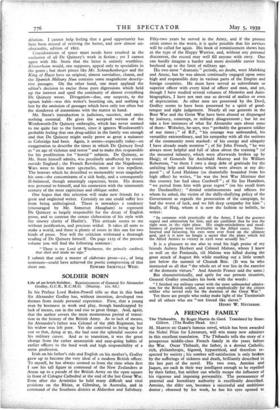SOLDIER BORN
Life of an Irish Soldier. Reminiscences of General Sir Alexander Godley, G.C.B., K.C.M.G. (Murray. 12$. 6d.)
IN his Preface Lord Baden-Powell tells us that in this book Sir Alexander Godley has, without intention, developed two themes from inside personal experience. First, that a. young man by keenness in work and play, though handicapped by lack of means, can in the end rise to great things. And, again, that the author covers the most momentous period of transi- tion in the history of the British Army. As to lack of means, Sir Alexander's father was Colonel of the 56th Regiment, but his widow was left poor. Yet she contrived to bring up her son so that, dying at 92, she had seen the splendid success of his military career. And as to transition, it was the great Change from the rather amateurish and easy-going habits of earlier officers to the hard work and high responsibility of a stern profession.
Irish on his father's side and English on his mother's, Godley grew up to become the very ideal of a modem British officer. To myself, he has always seemed so from the time when first I saw his tall figure in command of the New Zealanders at Anzac up to a parade of the British Army on the open square in front of Cologne Cathedral at the end of the last Great War. Even after the Armistice he held many • difficult and vital positions on the Rhine, at Gibraltar in Australia, and in' command of the Southern district at Aldershot and Salisbury.
Fifty-two years he served in the Army, and if the present crisis comes to the worst, it is quite possible that his services will be called for again. His book of reminiscences shows him as the type of the Happy Warrior, and, without any personal discontent, the record may well fill anyone with envy. One can hardly imagine a harder and more desirable career from boyhood up to the limit of military age.
His two most "dramatic" periods, no doubt, were Mafeking and Anzac, but he was almost continually engaged upon some
high and responsible duty in various parts of the Empire and foreign countries. He must have served as subordinate or
superior officer with every kind of officer and man, and yet, though I have studied several volumes of Memoirs and Auto- biographies, I have not met one so devoid of malice or even of depreciation. As other men are possessed by the Devil, Godley seems to have been possessed by a spirit of good- temper and right judgement. Nearly all our generals in the Boer War and the Great War have been abused or disparaged by jealousy, contempt, or military disagreement ; but let me take a few instances of what Sir Alexander says about some of them : Wolseley, he•says, was " probably the greatest soldier of our times ; " of B.P., " his courage was unbounded, his versatility extraordinary, and his sympathy with all the sections of the community most marked : of his energy and ubiquity I have already made mention " ; of Sir John French, " he was always most helpful and full of ideas about the training " (of the mounted infantry, which were afterwards broken up by Haig); of Generals Sir Archibald Murray and Sir William Robertson, " to them I owe a deep debt of gratitude for the unfailing help and kindness which were always at my dis- posal " ; of Lord Haldane (so shamefully hounded from his high office) he writes, " he was the best War Minister that this country has had since Cardwell " ; of Sir Ian Hamilton, " we parted from him with great regret " (on hi& recall from the Dardanelles): " denied reinforcements and officers for whom he asked, the victim of the shilly-shallying policy of the Government as regards the prosecution of the campaign, he had the worst of luck, and we felt deep sympathy for him " ; finally, of Haig, whom it is now the fashion to belittle, he writes : " In common with practically all the Army, I had the greatest regard and admiration for him, and am confident that he was the right man in the right place. His single-mindedness and stead- fastness of purpose were invaluable to the Allied cause. Stout- hearted and farseeing, his eyes were ever fixed on the ultimate goal, and it is now no longer a secret that the plans which led the Allied Armies to victory in 1918 were actually his."
It is a pleasure to me also to read his high praise of my 'friends Aubrey Herbert and Colonel Malone, whom I knew so well on the Peninsula, till Malone was killed during the great attack of August 8th while marking out a little trench just below the summit of Chunuk Bair. (It was he who instructed us all that "the whole art of war lies in the exercise
of the domestic virtues." And Anatole France said the -same.) But characteristically, and aptly for our present situation,
General Godley concludes his book with the words " I finished my military career with the most unbounded admira- tion for the British soldier, and most emphatically for the citizen soldier who served only for the duration of the Great War."
Yet there are people who today make light of the Territorials and all others who are " not forced like slaves."
HENRY W. NEVINSON.














































 Previous page
Previous page